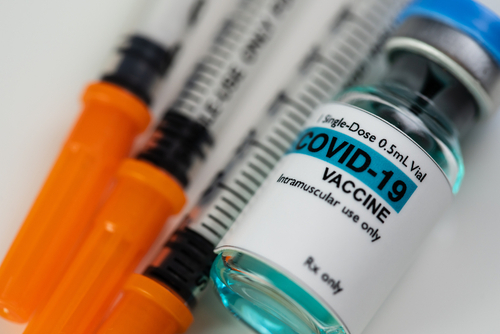
Top Trump Administration officials dismissed concerns that approval of a COVID-19 vaccine is being rushed to satisfy the President’s reelection efforts and assured the public they would volunteer to take any vaccine themselves that is ultimately approved by the government.
“We do feel the urgency of the moment,” Stephen Hahn, head of the Food and Drug Administration, told a Senate panel during a public hearing Wednesday, “but we will not cut corners in the process.”
Hahn’s remarks came amidst a flurry of concerns expressed by Democratic members of the Senate Committee on Health, Education, Labor and Pensions that President Trump is rushing the deliberative process to get the approval of a COVID-19 vaccine expedited in time for the Nov. 3 presidential elections. “President Trump is still putting politics ahead of public health,” said Sen. Patty Murray (D-WA). She cited recent public comments by the President downplaying the pandemic, such as “We’ve turned the corner,” or “it will just go away,” or predictions a vaccine will be available to the public by the beginning of November.
The hearing came as the number of cases of COVID-19 in the United States approached 7 million, and the number of American deaths reached 200,000.
Hahn, along with Anthony Fauci, director of the National Institute of Allergy and Infectious Diseases at NIH, Robert Redfield, director of CDC, and Adm. Brett Giroir, assistant Secretary for Health at the Department of Health and Human Services, assured the senators that any vaccine approved will undergo a rigorous scientific review and public comment period before being approved for public consumption and that the process will not be jeopardized by political expediency.
CDC’s Redfield assured the panel that there will be a public discussion during which all data will be shared with the public on each vaccine that will be recommended and ultimately approved. “It will be a public discussion,” he said.
Hahn said no vaccine will be authorized or approved “that we would not feel comfortable giving to our family.” Science will guide our decisions. We will not let anyone change that.”
“I would have no hesitancy to take that vaccine and to recommend it to my family,” said Giroir. “I have total confidence it will be a safe vaccine.”
“The FDA makes the ultimate decision, but what they do will be public,” insisted Fauci.
The officials agreed that a vaccine will probably not be widely available in the US until early- to mid-2021, with the first recipients most likely public health workers. Sen. Mitt Romney, R-Utah, asked FDA’s Hahn when he expected to receive the first application for approval, but Hahn said he didn’t know. He also said he does not know if the FDA has received any applications yet.
Sen. Murray recounted several reports of political interference in the management of the pandemic, including President Trump’s insistence that hydroxychloroquine or blood plasma be touted as a viable treatment for COVID-19, or that HHS Director Alex Azar interfered in the public communications process by directing all public notices be approved by his office, or that political appointees demanded to oversee COVID numbers and death figures. “There is a pattern of interference that is downright terrifying,’ Murray stated.
But the administration figures pushed back. Redfield insisted science and not politics is the top priority in CDC’s deliberations. He said the CDC guidance was changed because the original version posted on the CDC website was a draft that had not been technically reviewed by CDC.
FDA’s Hahn said, “you can assume that every one of the decisions which have been reached has been done by FDA scientists and is not political.”
Sen. Tammy Baldwin, D-Wis., asked Redfield about the CDC’s quick change in guidance for food manufacturing facilities after those issued in response to a COVID breakout at a Smithfield Foods meatpacking plant in South Dakota from words mandating certain practices to those amended by the phrase “when feasible.” Redfield said that was because CDC is not a regulatory agency and has no authority to mandate practices in disparate businesses. “We wanted to clarify it, so that is was understood to be a recommendation,” he told the senator.
Sen. Lamar Alexander, R-Tenn., chairman of the committee, touted what he called the successes of the Trump administration, namely the funding of billions in research and development of a vaccine, testing, and treatment for COVID. “Until a vaccine and treatment are commonly available, this explosion of diagnostic tests are our best bet to build public confidence,” that the public health system has the pandemic under control,” said Alexander.
Fauci was optimistic about the progress of a vaccine. ”Four COVID-19 vaccine candidates are in phase 3 clinical testing in the United States just over eight months after (COVID-19) was identified,” Fauci said. “This is an unprecedented feat for scientific community made possible by decades of progress in vaccine technology and a coordinated strategic approach across government, industry, and academia.”
Fauci downplayed predictions, including those by President Trump, that a vaccine will be ready and available by the beginning of November, saying, “I’m not sure if it will be by the end of this year.”
He said he believes they will know if one or more of the trial vaccines will be effective by November or December. He also noted three manufacturing plants run by the government are preparing to ramp up to produce hundreds of millions of doses of the vaccines upon approval.
“Then we may be able to turn around this terrible pandemic,” Fauci said.
Fauci also said the vaccine is expected to be available to the public free of charge, that individuals will not be at risk of getting COVID from the vaccine (as you can contract flu from the flu vaccine). It will probably require multiple vaccination shots over weeks.




